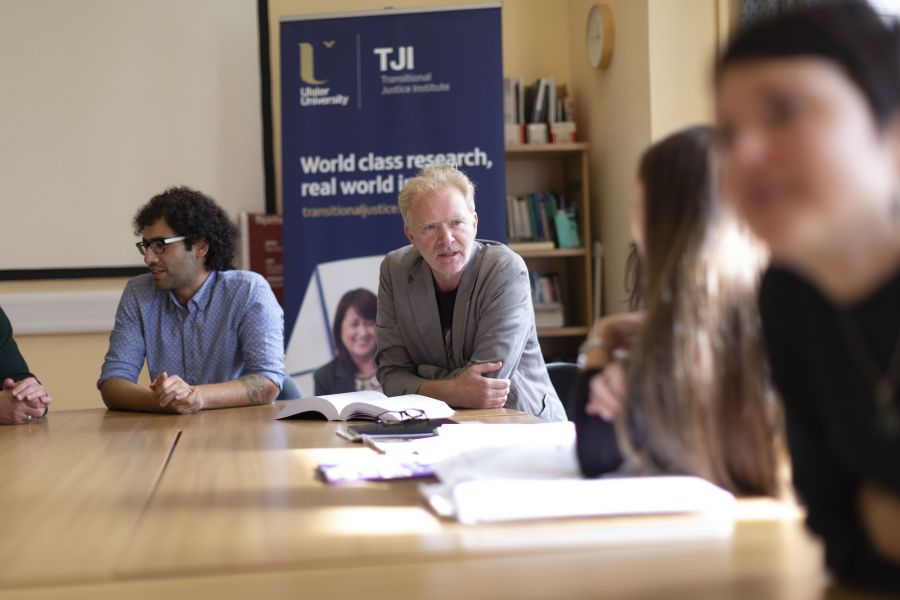Page content
Caitriona Mackel
Caitriona originally obtained an LLB in Law with Politics in 2002 and an MA in Peace and Conflict Studies in 2004 from Ulster University. After a long career in office management and accounts administration, she returned to academic studies obtaining an LLM in Human Rights and Transitional Justice at TJI in 2019. She had also been actively involved in local politics and various community relations projects in a voluntary capacity over the course of the last decade. She is particularly interested in segregation, economic, social and cultural rights and reconciliation in Northern Ireland which forms the basis for her PhD research.
Her project focuses on confronting housing inequality and segregation in Belfast by analysing the impact that an integrated approach to affirmative action and transitional justice might have on equality and reconciliation. Her supervisors are Prof Rory O’Connell and Dr Anne Smith.
Leah Rea
Leah recently completed a MA in Violence, Terrorism and Security at Queen’s University Belfast. For her dissertation, she focused on the role of the legislative process in legislative responses to terrorism, undertaking an examination of the influence of parliamentary scrutiny in the UK Parliament during the passage of identified historic and contemporary anti-terrorism legislation. She holds a MA (with Distinction) in Conflict Transformation and Social Justice from Queen’s University Belfast, where she examined the progression of human rights standards in the transition from conflict to peace through a comparative examination of historic and contemporary human rights campaigns in NI. This work led to the foundation for her PhD project: "Exploring the development of human rights in constitutional arrangements through an examination of the relationship between parliamentary conventions relating to devolution and the progression of human rights standards in Northern Ireland”.
During her postgraduate studies Leah was a member of a student working group on human rights, researching the necessity for a Bill of Rights for NI under the guidance of Professor Colin Harvey. Leah has completed an LLB (Hons) at Queen’s University Belfast, and during her undergraduate studies was awarded a bursary to attend a Utrecht Network human rights summer school and a Study USA scholarship from the British Council to study at Coe College, IA USA. During her study abroad year she was awarded an eight-month internship at a leading law firm in Cedar Rapids, IA. Upon her return to NI, she undertook a comparative research project, writing about payday loan companies and the need for legislative and policy reform in both the USA and the UK, and received the Certificate in American Business Practice.
Leah has also been working as a constituency caseworker for a North Belfast MLA, providing support and advocacy services in areas such as housing, social security, education especially for children with SEN, and health. Prior to this, Leah worked as a communications assistant and latterly policy and research assistant at a human rights organisation, providing political monitoring and parliamentary research support. She also has worked as a political researcher at a public affairs agency in Belfast. When not collecting historic political pamphlets and books, she will be tweeting threads explaining parliamentary proceedings - and her emotions as a long-suffering Ulster and Irish rugby supporter and boxing fan. Her supervisors are Dr Anne Smith and Dr Mark Simpson.
Julieann Campbell
A published author and poet, Julieann's most recent credits include ‘Setting the Truth Free: The Inside Story of the Bloody Sunday Justice Campaign’ (Liberties Press, 2012), which won the Christopher Ewart-Biggs Memorial Prize in 2013, and ‘Beyond the Silence: Women’s Unheard Voices from the Troubles’ (Guildhall Press, 2016), based on the experiences of marginalised women.
A former reporter for the Derry Journal and former Chair of the Bloody Sunday Trust, Julieann was also press officer for the families and wounded ahead of the Report of the Bloody Sunday Inquiry in 2010, and until recently worked as Heritage & Programmes Coordinator at the Museum of Free Derry. She is also actively involved with many truth and justice campaigns and is a director of the Pat Finucane Centre for Human Rights.
Julieann’s PhD research, "Alternative Justice: How Community Voices Inform Our Recent History", seeks to explore the social and psychological impact of oral history and storytelling work in the post-conflict north. Her supervisory team is Prof Brandon Hamber and Dr Adrian Grant.
Micheàl Hearty
Micheàl pursued undergraduate studies in history and sociology at QUB and later gained an MA in Conflict Transformation and Social Justice from The Senator George J. Mitchell Institute for Global Peace, Security and Justice.
During his time at QUB he also volunteered as a Student Research Assistant for the QUB Human Rights Centre's Historical Institutional Abuse Consultation. His assigned section was on symbolic reparations.
The working title of his PhD project is "How and why we do (not) collectively remember non-combatants in Northern Ireland?". The project will compare how and why non-combatants and combatants are collectively remembered in Northern Ireland; how and why non-combatants are collectively remembered during the conflict and during transition; how and why are collectively remembered throughout the prolonged process of transition in Northern Ireland. His supervisors are Dr Kris Brown and Dr Adrian Grant.
Frances Hague
Frances' project is on how shifts in global focuses on sexual and reproductive health and rights (SRHR) impact international policy discourse and the resulting implications for contexts affected by conflict.
She holds a Masters degree in International Development Studies from the University of Amsterdam (2015) and a Bachelors degree in Politics from Northumbria University (2012).
Frances has worked on policy analysis, advocacy and programme support for the civil society and development sectors in Ireland and worked alongside political and legislative institutions during her time as a caseworker for a Member of the European Parliament.
She has carried out research on Comprehensive Sexuality Education (CSE) and SRHR frameworks across a range of contexts, which informed her project focus. Frances’ supervisors are Dr Catherine O’Rourke and Dr Fidelma Ashe.

















